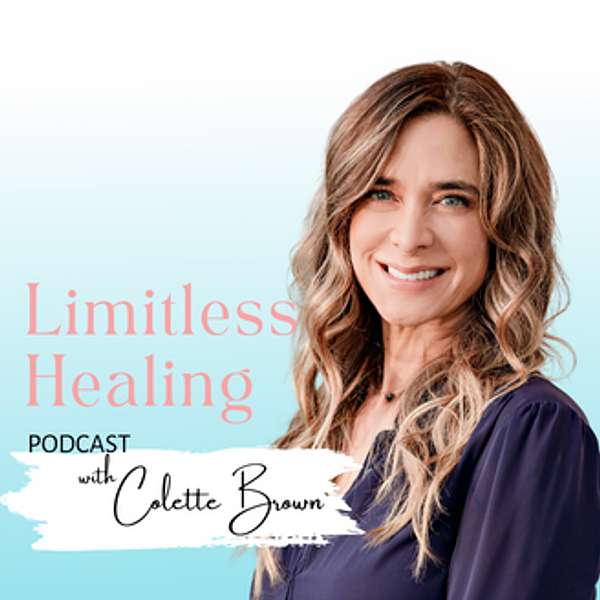
Limitless Healing with Colette Brown
Limitless Healing podcast shares stories of healing, resilience, and resources and tips that can change your life. I want to give you hope. For you. For someone you love. Healing begins with one small seed of hope.
Love, Colette™
Limitless Healing with Colette Brown
165. Jennifer Fraser, PhD, The Bullied Brain
As the holidays approach, I’ve been reflecting on the connection between mental health and the stress that many experience during this season. After diving into some research from the American Psychological Association and the National Alliance on Mental Illness, it’s clear that holiday stress impacts a significant portion of the population, 64% report feeling stressed, and for 38%, that stress intensifies specifically because of the holidays.
That’s why I’m revisiting an earlier episode featuring Jennifer Fraser, author of The Bully Brain.
Tune in to hear Jennifer’s personal story and the strategies she recommends for mental well being.
This episode is a soul-stirring episode of "Limitless Healing with Colette," where Colette speaks with Jennifer Fraser PhD on the profound journey of healing and empowerment.
Jennifer shares her deeply moving narrative and groundbreaking insights into brain health. In this episode, Jennifer delves into her personal ordeal with trauma, recounting the challenges she faced and the strides she's made in reconnecting with her past to foster a healthier, more integrated self.
Jennifer and Colette explore the disturbing dynamic of how adults, unwittingly or not, protect abusers, and how perpetrators exploit empathy to serve their own ends.
Jennifer brings her expertise in neuroscience to the table, discussing how genetics, environment, and epigenetics play into abusive behaviors and the hope that lies in rehabilitating "hurt brains."
Episode Highlights:
02:20 Jennifer's brother's learning disability experience shapes her brain interest
06:06 Jennifer turned to science to understand abuse
10:30 Jennifer's trauma memories were triggered when she uncovered her son's abuse
12:40 Questioning behavior when child abuse allegations arise
17:33 Genetics play a role, but environment factors are very influential
19:46 Internalized negativity can trap us in helplessness
22:01 Neuroscience reveals brain's reaction to split personality
31:32 Difficult for kids to recognize adult abuse
34:02 Be vigilent as abusers can appear kind and smart
37:46 How to identify abusers, through questioning, asking for evidence and sharing with others
40:39 You can heal a hurt brain: Neuroscience confirms benefits of exercise and mindfulness
Instagram: https://www.instagram.com/bulliedbrain/
Website: https://bulliedbrain.com/
Book: The Bullied Brain: Heal Your Scars and Restore Your Health: https://www.amazon.com/s?k=THE+BULLIED+BRAIN
Brain Training: Brain HQ: https://www.brainhq.com/
______________________________________
Connect with Colette:
Instagram: @wellnessbycolette
Website: love-colette.com
Thank you for listening to the Limitless Healing podcast with Colette Brown! It would mean the world if you would take one minute to follow, leave a 5 star review and share with those you love!
In Health,
Colette
[00:00:00] Colette Brown: As we get closer to the holidays, I am thinking about mental health and holiday depression. I did a little research and wanted to replay an episode I previously recorded. the American Psychological Association and the National Alliance on Mental Illness surveyed a broad U.S. Sample, aiming to capture a wide range of experiences related to holiday stress and mental health.
[00:00:28] The findings reflect national trends rather than results from a specific regional study. And about 64 percent report some degree of holiday stress and around 38 percent experience increased stress. Specifically due to the holidays. approximately 14 percent of adults feel their mental health worsens with triggers, including financial stress, loneliness, and pressure to meet social expectations.
[00:00:56] I wanted to go a little bit deeper. With the repost of Jennifer Fraser. She's the author of the bully brain. Many people suffer from past emotional trauma, which can compound with time if it isn't addressed. There are studies that are focused on the role of quote. Anniversary reactions where trauma survivors may experience heightened distress around dates associated with traumatic events.
[00:01:22] The holiday season often coincides with such anniversaries making unresolved emotions resurface for individuals who have experienced loss or abuse. The festivities can serve as a stark reminder of what was lost or past pain leading to feelings of grief, sadness. Or even anger.
[00:01:41] social support or lack thereof plays a crucial role in how trauma survivors experience the holidays. Research shows those with supportive relationships fare better as they have trusted people for comfort. Or distraction. The phenomenon known as quote holiday blues intersects with seasonal mental health concerns.
[00:02:03] While holiday blues are usually temporary, they can be intense for those with a trauma history Potentially triggering deeper depressive episodes or anxiety. Some research also shows how the commercialization of the holidays can affect trauma survivors.
[00:02:19] The emphasis on gift giving parties and social status can lead to financial stress, shame, or feelings of inadequacy, Especially if someone's trauma is tied to a socioeconomic hardship, therapeutic approaches such as cognitive behavioral therapy and trauma focused therapies aim to help individuals cope with holiday related triggers by addressing the underlying trauma and building resilience techniques like mindfulness, grounding exercises, and trauma informed holiday planning are recommended to manage symptoms.
[00:02:54] Research shows the importance of being prepared for a season with a plan for self care boundaries and emotional safety, especially for those with a history of mental abuse or unresolved trauma. listen in as Jennifer Fraser shares her personal story that led her to becoming a leading force, helping others with these conditions.
[00:03:18]